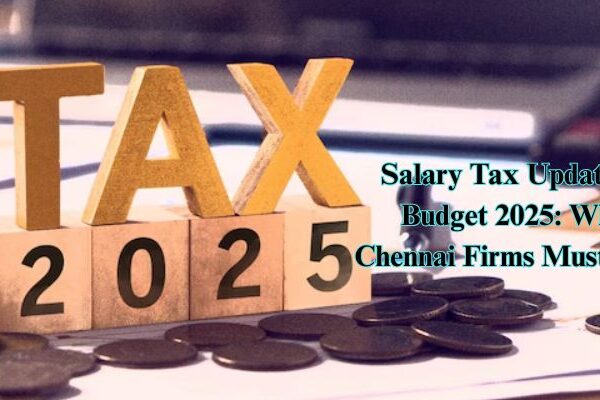The Budget 2025 has dropped, and it’s not just another policy document — it’s a game-changer for businesses and employees across the board. Especially for Chennai-based firms, where the blend of IT corridors, industrial zones, and growing startups has created a vibrant salary landscape, these tax updates aren’t just numbers — they’re strategic signals.
Let’s decode what Budget 2025 means for salary taxation and why Chennai employers must pay close attention. This isn’t just about compliance — it’s about staying ahead of the curve, building trust with employees, and future-proofing your financial operations.
Leading payroll outsourcing companies in Chennai are already stepping up to help businesses adapt—offering expert guidance, automated systems, and real-time insights that ensure smooth transitions and accurate implementation of the new rules.
1. Revised Slabs: One Nation, New Brackets
One of the boldest highlights of Budget 2025 is the recalibration of income tax slabs under the Simplified Regime. While the government continues to push the new regime, it now comes with broader slabs and slightly lower tax rates.
Key Impact for Employers in Chennai:
Salary restructuring is inevitable. With new slabs in place, Chennai’s employers will have to reevaluate take-home pay vs. tax liabilities.
Compensation modeling needs realignment. HR teams must simulate post-tax salaries to ensure transparency and employee satisfaction.
Salary negotiations will change. More than gross CTC, net pay discussions will dominate offer rollouts.
2. Standard Deduction Bump: A Relief Layer
In a surprising yet welcome move, the standard deduction has been increased under both the old and new tax regimes. This move favors salaried employees and pensioners, especially those in the middle-income group.
Why It Matters for Chennai:
Chennai’s rising cost of living means every deduction counts.
The added relief strengthens retention strategies — employees now feel the benefit in their pockets.
Companies must reflect the deduction changes in payslip explanations and help employees understand their new tax position.
3. HRA: Regional Adjustments Might Be on the Cards
There’s buzz about potential city-based reevaluation of HRA exemptions, especially for Tier-1 cities. While nothing concrete has changed in Budget 2025 regarding HRA rules, firms in high-rent cities like Chennai must stay alert.
Pro Tip for Employers:
Watch out for HRA audits. With a focus on TDS compliance, companies must ensure rental proofs and documentation are ironclad.
Consider digital rent declaration systems to avoid year-end chaos and mismatches.
Chennai’s zones like Adyar, OMR, and T Nagar see high rentals — so precision in HRA exemption matters now more than ever.
4. Leave Encashment Exemption Increased: A Farewell Bonus Upgrade
Another silver lining? The tax-exempt limit for leave encashment on retirement has been enhanced, bringing long-overdue relief to senior professionals and retirees.
Chennai’s Workforce Will Appreciate:
Many Chennai-based companies have legacy employees. For them, this is a significant boost.
HR policies around accumulated leaves and final settlements must be updated to reflect the new limits.
Communicating these changes during exit interviews or retirement briefings can enhance brand goodwill.
5. Gratuity Limits: Higher Cap, Happier Retirees
The exemption limit for gratuity payouts has seen an upward revision. For firms with long-term employees or robust retirement policies, this is a meaningful update.
What Chennai Firms Must Do:
Update payroll systems immediately to apply the new exemption threshold.
Train your HR and finance teams to handle this change without delays or disputes.
Encourage employees to understand long-term benefits rather than just immediate take-home pay.
6. Digital TDS Certificates: Welcome to Paperless Proofs
Budget 2025 pushes digitalization further by promoting fully automated TDS certificate generation and delivery.
Chennai’s Tech-Savvy Firms, Take Note:
This is your cue to upgrade legacy payroll systems.
Automate Form 16 and ensure employees can access them via self-service portals.
Reduced paper-trail also means faster resolution of tax queries from employees.
7. Advance Tax Forecasting: Now Mandatory for Large Payouts
The Budget introduces a mandatory forecast mechanism for employers disbursing variable pay or bonuses that exceed specified limits. Non-compliance can lead to penalties and disallowances.
Chennai’s IT and Startup Ecosystem Alert:
With ESOPs, bonuses, and performance-linked incentives common, this clause is crucial.
CFOs and HR heads must run quarterly tax impact scenarios to avoid year-end bottlenecks.
Communication is key — loop in employees early about the TDS impact of upcoming incentives.
8. PF on Gross, Not Just Basic: The Realignment Continues
Budget 2025 re-emphasizes its earlier directive — Provident Fund contributions must be aligned to gross pay structures, especially if allowances are artificially low.
Chennai Employers Must Realign:
Several firms still structure salaries with a low basic component — that’s risky now.
Restructure pay components to ensure compliance without hurting employee morale.
Consider rolling out internal awareness sessions on why “PF on gross” protects long-term retirement corpus.
9. Professional Tax: Watch for State-Level Tweaks
Although professional tax is a state subject, central fiscal frameworks often nudge revisions. Chennai-based employers must keep an eye out for changes in slabs, especially for higher-earning employees.
Stay Ahead By:
Reviewing monthly PT deductions for various salary ranges.
Preparing systems for automated updates when slabs change.
Keeping employees informed — no one likes silent deductions on payday.
10. What Chennai Firms Must Now Prioritize
With these updates sweeping across the salary spectrum, employers can’t afford to treat payroll as just another backend operation.
Here’s what every Chennai firm should prioritize now:
✅ Audit your salary structures in light of revised tax implications.
✅ Update your payroll software to reflect Budget 2025 changes in real time.
✅ Train your HR and finance teams to interpret and explain changes to employees.
✅ Strengthen your employee communication — simplify the tax talk.
✅ Incorporate tax-smart tools in your HR tech stack, like deduction simulators and payslip explainers.
In Conclusion: Chennai’s Payroll Future is Now
Chennai has always been a city that blends tradition with transformation. The 2025 salary tax updates demand that firms do the same — honoring legacy structures while embracing digitized, compliant, and employee-first payroll ecosystems.
This isn’t just about paying salaries. It’s about embedding trust, transparency, and tax-intelligence into the very core of compensation.
Leading businesses are turning to advanced payroll software in Chennai to meet these demands—offering real-time compliance, automated deductions, and personalized payroll insights.
Whether you’re a startup scaling up or an enterprise optimizing operations, this Budget is your invitation to rethink payroll not as an obligation — but as a competitive advantage.





Leave a Reply
You must be logged in to post a comment.